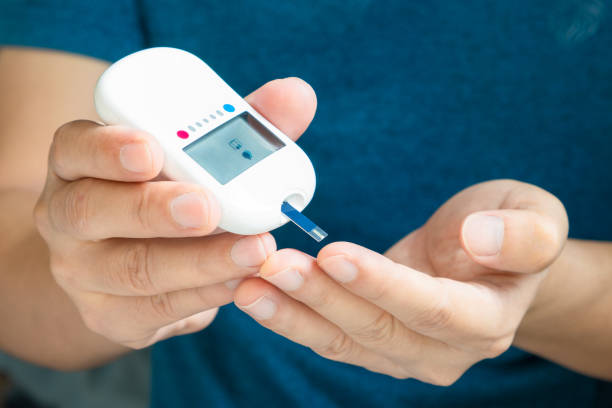Diabetes is a disease characterized by increased blood sugar levels in the body. There are many cases, especially in young people who have already had diabetes, due to a lifestyle that is mostly due to an unhealthy diet. In addition to a poor lifestyle, diabetes also affects genetically.
According to the American Diabetes Association, there are several types of diabetes, but the most common are type 1 and type 2 diabetes. Type 1 diabetes occurs when the body doesn’t produce insulin, while type 2 diabetes happens when it does not use insulin efficiently or does not produce enough insulin.
An unhealthy lifestyle can increase a person’s risk of developing Type 2 diabetes. Consumption of foods high in sugar and fat, as well as lack of physical activity, are major risk factors that can lead to insulin resistance and increased blood sugar levels.
Baca Juga: Prevent and Stop Diabetes
Diabetes mellitus or diabetes mellitus in the early days of diabetes, but it is more common in older people. And this diabetes is very vigilant because of this disease at the age of four.
But the reality is that more people suffer from diabetes when they are younger than 40 years of age. The life patterns of people in the past are very different from those of young people nowadays.
In this case how in a young age to a person to prevent and stop if the disease of diabetes due to factors in the descendants following some prevention in the youth to avoid diabetes as follows (Mulyati, Erika, and Yusuf 2022).
Reduce Consumption of Sugar and Sweets
In foods that contain sweets there is glucose, the type of sugar found in sweets, which functions as energy for the body. If excessive consumption of sugar can interfere with the body’s ability to regulate blood sugar levels well through insulin.
It can cause metabolic problems and increase the risk of obesity. So it’s important to be careful and minimize the amount of sugar and sweetened foods you consume to maintain a healthy diet and prevent potential health problems.
he Ministry of Health (Kemenkes) recommends that individuals limit their daily sugar intake to 10 percent of their total energy intake, which is equivalent to 200 Kcal. To give an overview, this can be visualized as about 4 tablespoons or 50 grams of sugar per person per day.
This recommended sugar intake is based on extensive research and studies conducted by health professionals.
Excess sugar consumption has been linked to a variety of health problems, including obesity, diabetes, heart disease, and dental problems. Therefore, it is important to monitor and control the amount of sugar we consume every day.
Routine Drinking of White Water
Ensuring adequate water intake is vital for the body to stay properly hydrated. Water not only helps in the excretion of toxins and waste through urine and sweat, but also helps to maintain the overall body fluid balance.
However, replacing water with sweet drinks such as cola or juice can significantly increase the likelihood of developing diabetes.
These drinks often contain sweeteners and excessive amounts of sugar, which can interfere with blood sugar levels and contribute to insulin resistance. Therefore, it is vital to prioritize water consumption to support optimal hydration and reduce the risk of diabetes.
Baca Juga: Nursing as a Profession
Avoid Processed Carbohydrates and Reduce Sugar Consumption
Processed carbohydrates, such as white bread, pasta, and sweet snacks, are highly processed and lose their natural fibers and nutrients. As a result, they are rapidly broken down by the body into simple sugar molecules, which are quickly absorbed into the bloodstream.
In a healthy individual, the pancreas releases insulin, a hormone that helps transport sugar from the bloodstream into the cells, where it can be used for energy or stored for later use. However, when processed carbohydrates are consumed overly or regularly, the body’s insulin response can be disrupted.
Insulin resistance is a condition in which the body’s cells become less responsive to the effects of insulin. This means that more insulin is needed to the same blood sugar reduction effect. In response to insulin resistance, the pancreas compensates by producing higher insulin levels to try to overcome the resistance and maintain normal blood sugar levels.
Keep Your Weight to Avoid Obesity
Overweight or obesity can cause insulin resistance, in which body cells become less responsive to insulin, the hormone responsible for regulating blood sugar levels.
In addition, overweight can cause inflammation in the body, which can contribute more to insulin resistance and the development of type 2 diabetes.
The distribution of fat is also a key factor in the relationship between obesity and type 2 diabetes. Excess fat around the abdomen, known as visceral fat, is very dangerous because it releases inflammatory substances that can interfere with insulin signals and increase the risk of developing diabetes.
So it’s important for individuals who are overweight or obese to take steps to lose weight in order to reduce the risk of developing type 2 diabetes.
This can be achieved through a combination of a healthy diet, regular physical activity, and lifestyle changes. Seeking support from a health professional, such as a doctor or a nutritionist, can also help in managing weight and reducing the risk of diabetes.
Baca Juga: The Impact of Technology on Mental Health in the Digital Age
Sports Effectively
Regular exercise is also known to improve cardiovascular health, reduce the risk of other chronic diseases such as heart disease and stroke, and improve overall mental well-being. Exercise can also help control blood pressure and cholesterol levels, which are important factors in preventing diabetes.
Moreover, exercise can help improve energy levels, improve sleep quality, and reduce stress and anxiety, all of which can contribute to a healthier lifestyle and lower risk of developing diabetes. Overall, integrating routine physical activity into your routine is a key component in preventing diabetes andining overall health.
Diabetes is a very dangerous disease, so there’s no reason why you can’t prevent and stop diabetes, whether it’s a genetic factor or a young age factor.
Conclusion
Diabetes can affect all ages, young, old, even children. So from that we have to take care is our way of life, we can eat the sweet sweet but not too much in consuming it. All the excess is not good.
And indeed this disease can also arise because of genetic factors, if a person has diabetes because of a genetic factor, then the effort he makes is to cut the disease off from a young age.
So that the next offspring are not affected by diabetes with what? With exercise, a lot of drinking white water do not eat ready-made foods, keep weight to avoid obesity and minimize consumption of sugar and sweets.
Penulis: Sulthan Adnan Alwafizain
Mahasiswa Pendidikan Bahasa Arab Universitas Muhammadiyah Prof. Dr. Hamka
Editor: Ika Ayuni Lestari
Bahasa: Rahmat Al Kafi
Ikuti berita terbaru di Google News
References
Mulyati, K. A. Erika, and Saldy Yusuf. 2022. “The Effectiveness of Diet and Physical Activity on The Prevention of Diabetes in Pre-Diabates Adolescents: A Literature Review.” Jurnal Ilmiah Keperawatan (Scientific Journal of Nursing) 8(1): 41–50. file:///C:/Users/ACER/Downloads/805-Article Text-4396-1-10-20220227.pdf.













